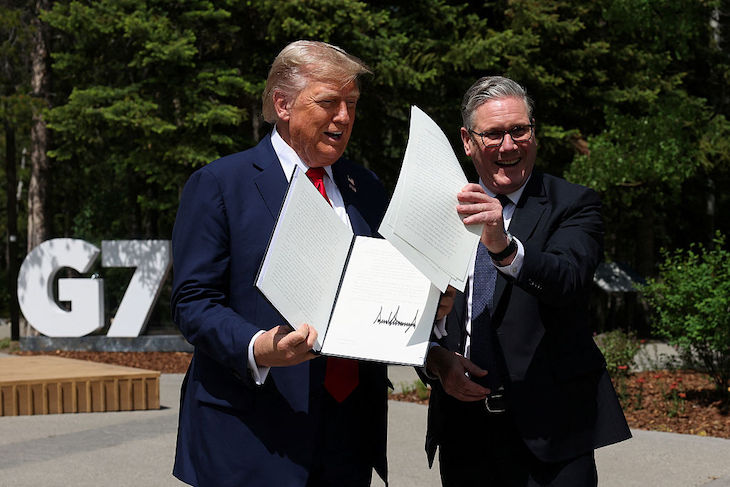Donald Trump and Keir Starmer’s transatlantic trade deal has finally been signed. Before making an early exit from the G7, the US president approved an executive order giving legal effect to parts of the US-UK deal. The outline of the agreement was settled weeks earlier during a conference call, with Trump in the White House and Peter Mandelson, the UK ambassador in Washington, standing, slightly creepily, over his shoulder, as Starmer dialled in from 4,000 miles away.
If the deal is to progress further, an almighty row could be brewing
The delay in any further announcement left conservatives, and businesses, wondering whether the deal outline a month ago was turning into a fiction. But the executive order Trump signed on Monday gives effect to the agreement at the end of the month. There are, however, some changes to what had originally been trailed one month ago.
Tariffs on UK car exports to the United States (the UK’s biggest goods export) will come down from 27.5 per cent to 10 per cent. But the 100,000 limit on the number of cars we can export to the US effectively puts a cap on growth within that part of the industry, as we already export roughly that amount of cars anyway. There was a bonus announcement too with Britain’s aerospace sector exempted from even the baseline 10 per cent tariffs.
It was bad news for steel, though. The agreed reduction of tariffs from 25 per cent to zero was absent from the president’s executive order. Civil servants working on the deal say talks are ongoing, with disputes remaining over quotas on the amount of steel we’d be allowed to send before steeper tariffs kick in. Fingers crossed. There also seem to be complications surrounding Chinese ownership of British steel – something the Americans clearly don’t like.
Trump wasn’t his best as he announced the signing of the deal alongside Starmer outside the G7 meeting in Canada. A slip of the tongue led him to say the deal was with the EU, rather than the UK. He then managed to drop the papers everywhere before Starmer helped pick them up. The Prime Minister fared better with Trump saying: ‘He’s slightly more liberal than I but for some reason we get along.’
The deal finally being given legal effect by the president is clearly good news for Britain and undeniably a Brexit win. Had the UK had a closer relationship with the EU we’d be lumped in with the higher tariffs they’re having to put up across all goods; we’d also get carried along with any retaliatory measures imposed by Brussels. These might please voters but they are, in reality, economic self harm.
We shouldn’t pretend this deal is more than it is though. This is not a wide-ranging free trade agreement – something which the government says it is still striving towards – but measures that mitigate the tariffs Trump unleashed on the world on his ‘liberation day’ in April.
We are certainly better off, both compared with much of the world and with when those tariffs were initially announced. But we are still in a worse position than at the start of the year. What’s also clear is that the White House is calling the shots. They feel under no pressure to further the deal with us and will only sign incremental steps as and when it suits them.
If the deal is to progress further, an almighty row could be brewing. One of the aspects of global trade that reportedly enrages Trump is how much Americans – and American hospitals – pay for drugs, even those produced domestically. The NHS, as a single buyer purchasing in bulk on a massive scale, secures medicines at far lower prices. Trump sees that as unfair. He can’t do much to force companies to lower prices for US customers, but he can try to push them up for the UK. Indeed, documents released after the agreement was outlined in May say the NHS will ‘look at the concerns of the president’ on this issue. But it’s hard to see how any British Prime Minister or Health Secretary could agree to anything that increases NHS costs – politically or fiscally. This aspect of the deal may be flying under the radar for now, but it could well stop further progress towards free trade in its tracks.








Comments